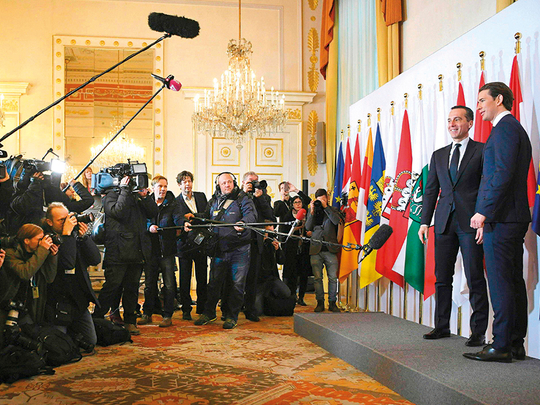
VIENNA: With a heavy police presence keeping thousands of protesters at bay, Austria’s far right was sworn in Monday as part of the new government, rounding off a triumphant year for Europe’s nationalists.
The coalition between the conservative People’s Party (OeVP) and the Freedom Party (FPOe) has pledged to stop illegal immigration, cut taxes and resist EU centralisation.
It is led by Chancellor Sebastian Kurz, who took over the OeVP in May and yanked it to the right, securing his party first place in October elections. At 31, Kurz is the world’s youngest leader.
At his side for the investiture by Austria’s president in the Hapsburg dynasty’s imperial palace in Vienna was FPOe chief Heinz-Christian Strache, 48, now vice-chancellor, and FPOe general secretary Herbert Kickl, the new interior minister.
Strache has said Islam “has no place in Austria” and last year called German Chancellor Angela Merkel “the most dangerous woman in Europe” for her open-door refugee policy.
On Sunday, Strache trumpeted to his 750,000 followers on Facebook that the new government would slash social benefits for asylum seekers.
“It will no longer happen that migrants who have never worked here a single day or paid anything into the social system will get thousands of euros in welfare!” he said in a post that has gained 10,000 “likes”.
Kickl is a former speech writer for Strache’s predecessor Joerg Haider, whose 2000 entry into government prompted an outcry and soul-searching in Europe that appear largely absent this time.
Some 5,500 people took part in demonstrations on Monday, police told AFP, brandishing placards such as “refugees welcome” and “Nazis out”.
Smoke grenade
A heavy police presence of about 1,500 officers, with helicopters overhead and water-cannon trucks at the ready, blocked off the area around the Hofburg palace.
At one point police fired a smoke grenade when some protesters tried to break through a barricade, an AFP photographer said, but otherwise police said there were only minor incidents.
“I am very worried,” protester Stefanie, 26, told AFP. “We saw what happened 15 years ago. The rich are favoured at the expense of the weak, the poor, refugees.”
The FPOe also obtained the defence and foreign ministries, while the OeVP got finance, economy and justice among other portfolios, and will continue to handle EU affairs.
Both Kurz and Strache won over voters two months ago by stoking concerns about immigration after the record influx in 2015, mirroring elections elsewhere in Europe this year.
Geert Wilders’ Freedom Party became the second-largest in The Netherlands, Marine Le Pen of France’s National Front was in a runoff for the presidency and the Alternative for Germany entered the Bundestag.
“Euro-sceptic politics is now mainstream,” Nigel Farage, former head of the UK Independence Party, said on Twitter.
But the FPOe is rare in western Europe in securing real power.
Speaking at a far-right congress in Prague on Saturday, Wilders said the FPOe’s entry into government was “an excellent result”, while Le Pen called it “very good news for Europe”.
Support for the weakest
“Every election demonstrates a form of rejection of the European Union,” Le Pen said, echoing the Euro-scepticism shown by the FPOe in the past.
Austrian President Alexander Van der Bellen called Monday on the new government to show “respect for people who think differently, respect for the rights of minorities and support for the weakest in our society”.
Both Kurz and Strache emphasised however on Saturday that Vienna would stay staunchly pro-EU, ruling out a referendum on EU membership.
But Kurz said that during Austria’s presidency of the European Union, set for the second half of 2018, Vienna would press for Brussels to have less say in areas that he believes should be up to member states.
Kurz, due in Brussels on Tuesday, said he envisions a European Union which should be “stronger in big questions and which should step back on smaller issues”.
Austria will also “actively work” towards easing EU sanctions on Russia — a demand of the FPOe — but only “in unison” with the rest of the European Union. It also wants Turkey’s talks to join the bloc to end.
“It’s a great day for our homeland Austria,” Strache said on Facebook on Monday.











